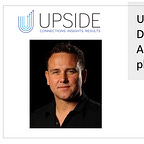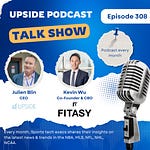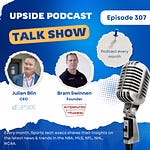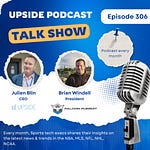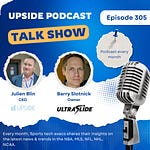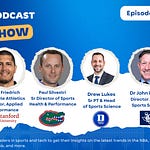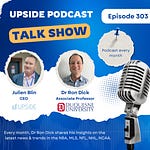This week, we had the honor to interview Dave Hancock, CEO of Apollo, a leading Athlete Management Systems (AMS) vendor.
Dave Hancock’s background:
Back in 2006, Dave has worked for Chelsea Football Club as their Head Physiotherapist. Then in 2008, he became the first English Performance Director in the NBA for the New York Knicks. And then in 2010, Dave was honored to be asked by the English FA to be the first team physiotherapist at a 2010 World Cup and 2012 European Championship for the England National Team. Dave has worked for some of the best athletes in the world from David Beckham, Odell Beckham Junior, Kevin Durant, John Terry, Frank Lampard to some of the best coaches in sports, such as Phil Jackson, Jose Mourinho, Terry Venables, Fabio Capello, Graham Souness to name a few.
Dave, also has been a member of the Nike Performance Board for five years.
Dave has been on both sides of the fence as a former Head of Performance, but also a CEO of sports tech startup.
Apollo - background:
His company, Apollo, has built an AMS system that allows the user to build out bespoke methods of collecting data. Its modern loose framework allows other products and connections with existing systems to seamlessly collect and centralize an organization's data without moving from the current products /software they are using.
It removes the silos of departments data. Centralizing a teams data no matter what products or software they use is key!
Apollo - customers:
With over 250 teams from the Premier League, NBA , MLB, NFL, NHL, AFL, Rugby League, Olympic and Collegiate, use its platform today. Select customers include teams such as Manchester United FC, Brighton FC, Gold Coast Suns, New Orleans Pelicans, USA Volleyball , Washington Nationals, Phillies, USC, LSU, Purdue, just to name a few.
Here is a video highlighting Apollo’s AMS solution:
Here is a diagram illustrating Apollo’s AMS solution:
Picture: Apollo
📝Show Notes: Throughout this interview, we touched on Dave’s background, and his role as CEO of Apollo. We also touched on his AMS platform, how his AMS platform is different from other AMS platforms. We also discussed the issues with current injury risk assessment solutions, and we talked about some of the teams they work with, the benefits for the teams to use its platform and his plans for the next 12 months.
Best Quotes: Here are some of the key discussion points and best quotes from our conversation with Dave:
On how he started working as a physical therapist:
“I was a pretty good rugby player, amateur rugby union, and then I got injured and I went to see a physio. I fell in love with the fact that you can help people, mend people, and heal people around sport. So at a very young age, I was determined to become a physical therapist. I worked in hospitals and worked in many different departments such as: liver transplant, cystic fibrosis, but my passion was always sport”.
“So my first job was in the Professional Rugby League in 1993, where I worked for Leeds Rugby also known as Leeds Rhinos. Then at the end of '93, I went for a working interview for five days with Graham Taylor, who was the ex England Manager, then at Wolves FC. There I worked as the assistant physio at Wolves for four/five years. And then I became the first team physio for the Wolves. That was the start of my career in Professional Soccer”.
On how Dave ended up working for Leeds United and Chelsea FC and then the NY Knicks (NBA):
“I got headhunted to go to Leeds United. That time Leeds was a top 2/3 Premier League team. And then I went on to the Champions League run. It was 2000. It was players like Mark Viduka, Rio Ferdinand, Robbie Fowler. So we were buying big players and obviously challenging Manchester United at that time. And then obviously, if you know anything about the history of Leeds United FC, the bottom fell out, they ran out of money and we dropped out of the league and I stuck with them because I designed their training facility. I'd implemented all the things I'd learnt from Blackburn Rovers Fc and Wolves Fc”.
“Then I got headhunted again, for an offer that I really couldn't refuse, which was to go as the Head Physio of Chelsea Football Club. And then there, I was fortunate enough to win titles and cups with the team. And then I got approached again, to go to America, to the NBA, and as you said to the New York Knicks, where I was the Performance Director for seven years at the Knicks”.
On why he decided to found Apollo:
“So Apollo is sort of my brain child and I've used other products that have been on the market. And I've always been frustrated as someone at the coalface, if you like, using those products. And the reason is because they don't always do what you want it to do for you. You have to work within the confines of the box, of the software. And every organization that I've worked for, and as I've developed as a performance director, as a physio, as a strength coach or whoever we'd be working with, everyone's got different ideas and views, but if the software can't adapt and help you with regard to your views and what you're trying to achieve, both visually and to actually crunch the numbers and look at the data, whether it's objectively or even overlap with subjectively information, that means that the systems are flawed”.
On Apollo and how its AMS platform is different from some other AMS platforms: “ So what I've done with Apollo is behind the scenes for the last three years, basically built a platform, a foundation that allows any organization or team to build their own interface, their own front end, their own backend, their own reports. So it's almost like you're giving them a foundation to build their house. If they want to change their house, they can change it. The problem with our competitors and the other boxes is that you're limited in what you can do with those systems”.
On how the Apollo platform is highly customizable: “So I decided when I basically took over the US company that I was going to start again and build a brand new product that had everything in the backend for the user to change whatever they want. So for instance, if we wanted to have a system in Spanish for a Major League Baseball team, because they've got a feeder club in Puerto Rico, you can run a translation script and have the system in Spanish. If I wanted to plug and play the system with video, whether you're using Huddle or EXOS or any editing tool that the teams would use, we can bring in the videos because we have a video warehouse within our ecosystem. And then the other key is APIs. We have over 35 APIs now where we can basically build APIs within five to seven days. We can basically centralize people's data from whatever systems that they're using, whether it's their own internal system or whether it's a product or hardware that they're using such as VALD or NordBords or Inbody, or even Wyscout. So recruitment, coaching, video, it doesn't matter. Other AMS vendors do have APIs, but I don't know of any system that has 35 APIs”.
On their great customer support experience: “We actually put one engineer and one field manager with each client. And we also have a chat group where every single member of the organization from CEO, GM, to athletic training rooms, sports scientists, coaches, they all have access to the chatroom and they may fire to us, any issues that they're having and we get it resolved there and then”.
On their ability to let teams create great data visualization:
“If you are looking at complicated algorithms, models, you'll lose a coach. The coach just needs to know when to stop, when to go, whether they're good to go, or they're not good to go. So simplistic visualizations and dashboards is what we do very, very well. And we have the tools like Power BI, Tableau, even Excel. And we have a whole fleet of engineers that basically become experts at building these visualizations for what the client wants. And then what you're doing is you're incorporating the coaching staff into the ecosystem. So we basically are like a one club shop, where we can plug and play our system or a part of our system into an already existing system”.
“What we've done with Brighton Football Club this year is that we can go in and we can basically create a whole system built from the ground up exactly how they want it, exactly how Potter their head coach wants, their head of performance wants, their nutritionist wants, psychologist wants, even the administration office and the GM want. We can build it because we've got the tools around it and the team around it to support them”.
On the problem with current injury risk assessment tools: “It's pie in the sky. So let's take a couple of our clients. Let's take Manchester United and Brighton Football Club. They both play soccer. They both play in the Premier League. I know what they do underneath the hood. What they do is completely different. So therefore, even though it's the same sport, you can't use the same model or algorithm to look at what Manchester United do versus what Brighton does. You can look at risk, but my view where people are going wrong with all of this is that they're too weighted on GPS data. The key that's missing here in my view is more of the game data. Like the game statistics. How far did they run and what was the intensities of the run and the loads per minute and the decelerations, the accelerations? Everyone's doing that. But the injury rates across all the leagues, are not being reduced”.
On some of the leagues and customers using their AMS platform:
“We work with AFL, Rugby League teams down under in Australia, Premier League teams, Championship teams. And then in the US, we're in every league, NBA, MLB, NFL, NHL. And we have clients that we work with, some I'm allowed to tell you, and some I'm even not allowed to tell you. And then at college level, we work with teams like Purdue, USC, LSU. So we're working with multiple different teams from their football organization, to their baseball, to the basketball, to their track and field”.
“We were involved with the National Championships with LSU in the football a couple years ago”.
“We are working with the Major League Baseball World Series of the Washington Nationals, and obviously with Manchester United, we've basically worked throughout their entire club for the last six, seven years”.
On their plans for the next 12 months: “We don't need to raise money at the moment. Basically, we're growing very fast. We have many different clients. This month, we've basically got six clients' contracts sitting on the table. So our growth is really fast, which is helping us expand. And then myself, I'm financially backing it. So I'm putting my money where my mouth is, and I am really driving this company. I'm not interested in going back into sport's anymore. This is sort of my way of helping teams and organizations from my own personal experiences and my team's experiences to try and make things better for them on the ground”.
PS: If you are a sports tech startup and want to be interviewed on the Upside podcast or be profiled in our Upside newsletter please reach out to us at julien@sportscouncilsv.com to learn more.
You may also like:
⭐Sports Performance Roles & Best Practices (Head of Performance, Head Athletic Trainer..)
🔥Upside Chat: Alexi Pianosi, Strengths and Conditioning Coach, Pittsburgh Penguins (NHL)
🔥Upside Chat: Pierre Barrieu, High Performance Director, Toronto FC (MLS)
🔥Upside Chat: Len Zaichkowsky, World-Class’ Sports Biofeedback Expert
⭐ Upside Startup Spotlight: Neurocess (Leading injury prevention startup)
⌚ 🏀 Upside Analysis: Sports Leagues' regulation towards wearables

